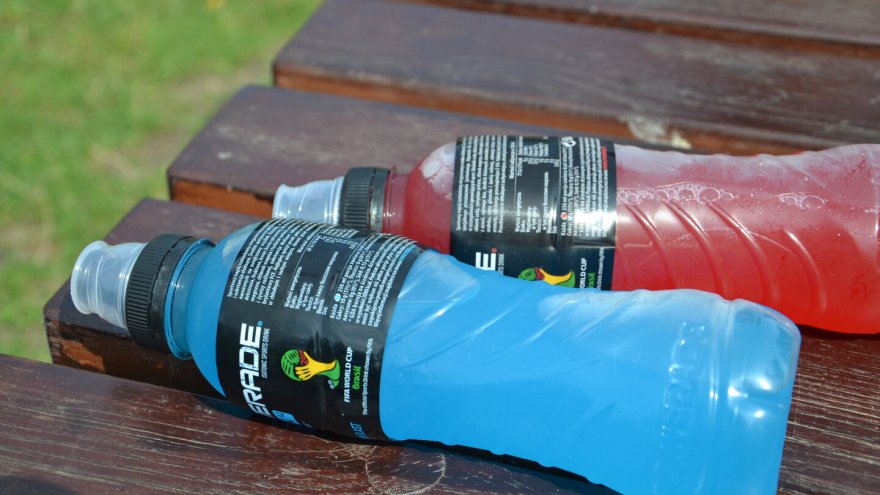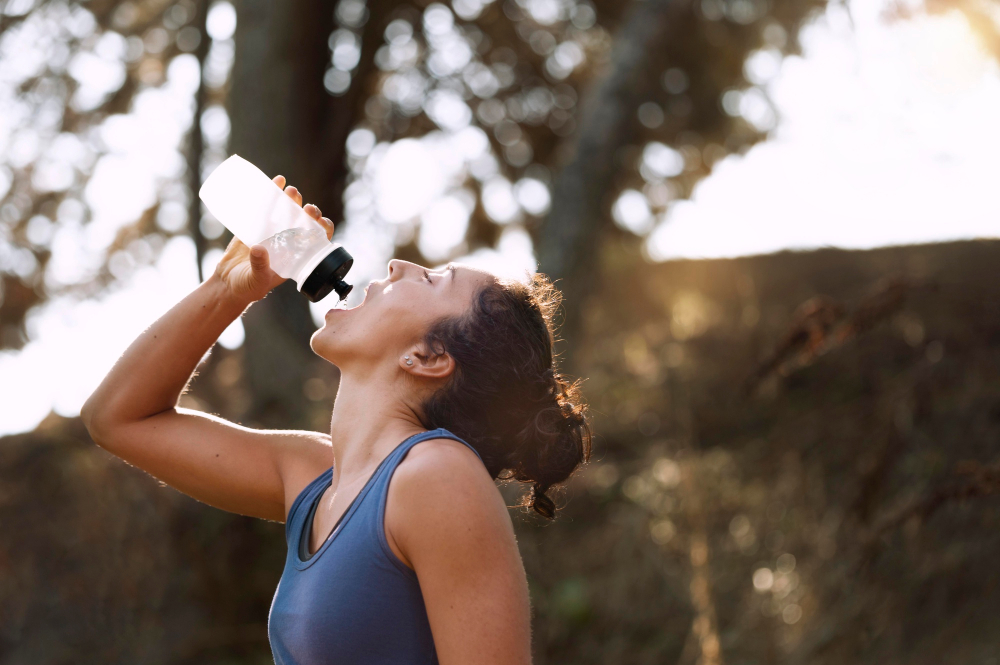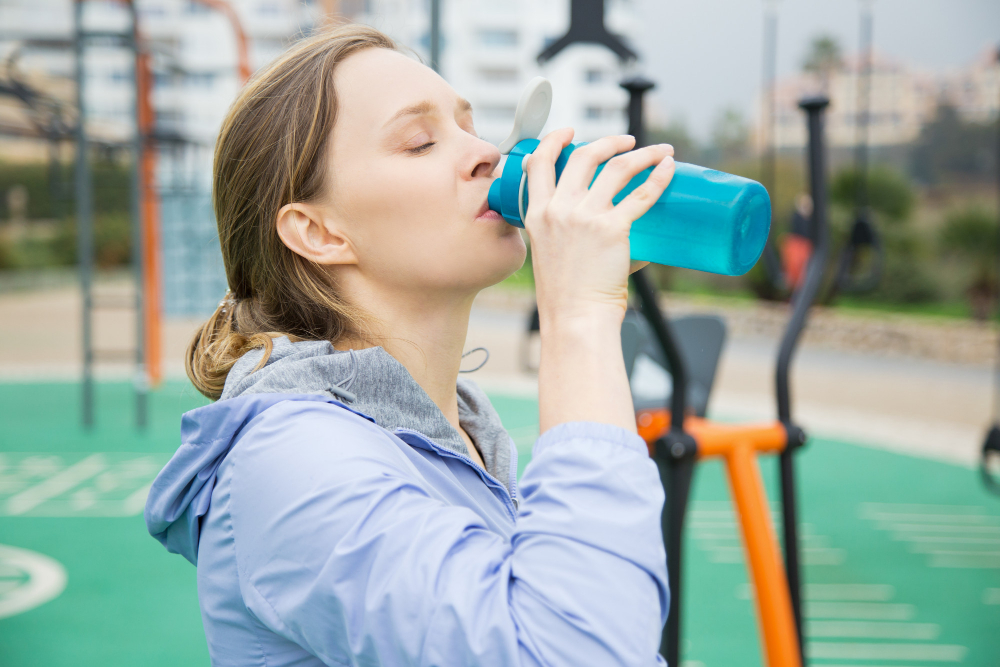When to Drink Electrolytes: Before or After Workout?

Athletes should consume electrolyte drinks before, during, and after the workout. Adequate hydration involves a great deal more than just taking in some water. Especially with high-intensity workouts, it is important to replenish electrolyte loss and maintain a sufficient electrolyte balance.
Should I Drink Water or Electrolytes During a Workout?
If you are wondering whether you need electrolytes or if water will suffice, here are some things to consider:
Activity Level: A leisurely bike ride may not require you to take in electrolytes even if you are biking for a couple of hours, whereas a 60-minute run would probably have the athlete benefiting from an electrolyte powder or drink.
Hydration Level: Do you feel thirsty? Once you feel thirsty, you are already starting to dehydrate. This is why it is essential to hydrate in the days preceding a vigorous athletic event adequately.
Temperature: During very hot temperatures, you are more likely to sweat and lose electrolytes.
Time on Task: Hydrate with electrolytes if you plan to do a workout lasting 45 minutes or more.
When Should You Drink Electrolytes?
The science behind maintaining proper hydration and preventing an electrolyte imbalance has been studied in great depth. According to the Journal of Sport Science, electrolyte consumption is essential at many different times.
First, any amount of physical activity in hot temperatures can deplete a person’s hydration stores. Participating in intense exercise is another way to end up dehydrated if you are not staying on top of fluid and electrolyte intake.
A good rule of thumb is to take fluid before feeling thirsty. Once you start to feel thirsty, it is technically too late, which is why experts encourage athletes to start consuming electrolytes pre-workout.
Using electrolytes before, during, and post-workout helps achieve the best possible scenario for getting a quality workout and helping aid in recovery.

How Long Do Electrolytes Take to Absorb?
For athletes wondering when to consume sports drinks or other fluids meant to front-load electrolyte levels, begin drinking the fluids 45 to 60 minutes before the activity. This gives your body some time to absorb the liquids.
If you are experiencing mild dehydration or thirst, it will only take your body about 15 minutes to reap the benefits of drinking electrolytes. However, if you wait too long, proper rehydration can take up to 120 minutes.
How Long Should I Wait Before Drinking Electrolytes After a Workout?
There is no need to wait when rehydrating your body post-workout. Replenishing those electrolytes will set your body up for optimal recovery.
As mentioned, there are benefits to front-loading your workout with electrolytes, drinking them during the workout, as well as having them post-workout.
What Are the Benefits of Electrolytes?
People lose electrolytes in different ways. Athletes usually lose electrolytes by sweating and urinating. When someone is sick, they can lose electrolytes through diarrhea or vomiting. As you can imagine, it is very easy to get dehydrated when this occurs.
Although water is crucial for the human body to work correctly, there are instances where plain water just does not cut it.
How do electrolytes help an athlete?
- Cramp Prevention: A loss of electrolytes can cause muscle cramps in an athlete. Electrolyte replenishment can be done through liquid or tablet supplements.
- Improved Athletic Performance: Proper hydration will help allow an athlete to push through challenging workouts and may result in better achievement on race day. Muscle function improves when adequately hydrated.
- Quicker Recovery: Hoping to bounce back after a challenging workout? Sports nutrition science points to electrolytes aiding in recovery.
- Rehydration: Taking in electrolytes will rehydrate you faster than plain water. Don’t care for sports drinks? Coconut water is chock full of natural electrolytes.
Hyponatremia is a dangerous state that occurs when the body experiences a severe sodium imbalance because the electrolytes are too low. Getting in front of this by hydrating before your body can get into trouble is important.
What Are the Electrolytes Found in the Body?
Seven electrolytes are naturally found in the body. These include chloride, calcium, bicarbonate, sodium, potassium, magnesium, and phosphate.
It is vital to have a balance of electrolytes in the body. In other words, you can get too much of a good thing.
Can You Drink Too Many Electrolytes?
Just like anything, you can get too much of a good thing. Even though your body needs electrolytes, if you have too many, it can be unhealthy.
Referred to as hypernatremia, too much sodium in the body can cause dizziness, vomiting, and diarrhea.

Is it OK to Drink Electrolytes Every Day?
Even though the media would have you think otherwise, the average person does not require electrolyte replenishment daily. Sports drinks were created to be consumed by people engaging in rigorous physical activity or working in scorching temperatures.
People should consume about 12 ounces of water for every pound of sweat they have lost during an exercise session. Although you should not obsess too much about your body weight, weighing yourself before and after a workout is an excellent way to gauge dehydration.
4 Efficient Ways to Replenish Electrolytes
- Foods: Although not the most efficient way to replenish electrolytes, you can find them in many foods. Fruit such as watermelon, strawberries, and oranges are a refreshing way to help bring balance back to your body. You can also drink coconut water as a natural alternative to sports drinks.
- Gels: There are electrolyte energy gels such as UCan or Huma Plus. These are popular because they are easy to carry.
- Sports Drinks: Sports drinks like Powerade and Gatorade are handed out at races and have become a very mainstream beverage. You can purchase them by bottle or in a packet that can be mixed with water.
- Tablets: There are tablets and capsules, such as Salt Sticks, that help maintain fluid balance.
Latest Articles
 Is Running on a Treadmill Easier Than Running Outside?Runners have their own preferences, whether it is treadmill running, running outside on the road, or exploring trails. So...
Is Running on a Treadmill Easier Than Running Outside?Runners have their own preferences, whether it is treadmill running, running outside on the road, or exploring trails. So... Is It OK to Use Trail Running Shoes on the Road?While trail running shoes can be used on roads, especially in situations where a runner encounters mixed terrains or pref...
Is It OK to Use Trail Running Shoes on the Road?While trail running shoes can be used on roads, especially in situations where a runner encounters mixed terrains or pref... How to Fix Sore Quads After Running?Rest, ice, gentle stretching, and over-the-counter pain relievers can help soothe sore quads after running. Also, ensure ...
How to Fix Sore Quads After Running?Rest, ice, gentle stretching, and over-the-counter pain relievers can help soothe sore quads after running. Also, ensure ... 10 Fruits With The Most Electrolytes to Replace Sports DrinksThese fruits are high in electrolytes such as potassium, magnesium, and calcium, essential for hydration, muscle function...
10 Fruits With The Most Electrolytes to Replace Sports DrinksThese fruits are high in electrolytes such as potassium, magnesium, and calcium, essential for hydration, muscle function...

